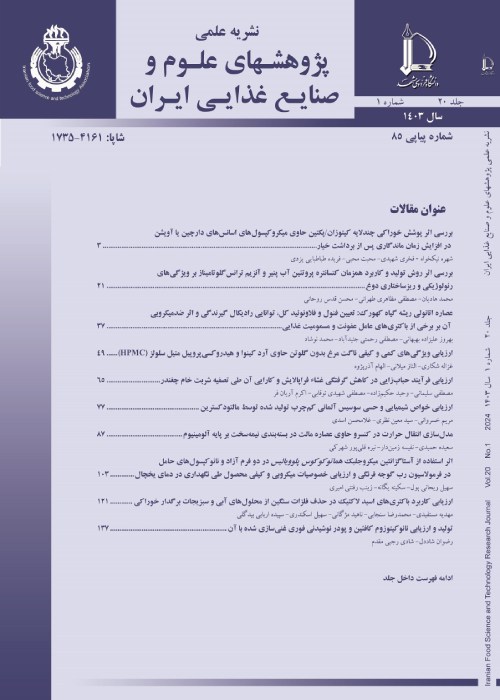The effect of wheat germ powder on physicochemical, microbial and sensory properties of kefir beverage
Kefir is a traditional beverage produced by fermented milk with kefir grains, which is becoming increasingly popular throughout the world due to its health benefits and disease prevention properties beyond its basic nutritional value. The grains contain a mixture of complex microflora such as lactic acid bacteria, yeast and sometimes acetic acid bacteria which are lodged by a polysaccharide matrix calls “kefiran”. Kefir is a self-carbonated beverage that owes its distinctive flavor to a mixture of lactic acid, ethanol, carbon dioxide and other flavor products such as acetaldehyde and acetone. Kefir has been recommended for the treatment of several clinical conditions such as gastrointestinal problems, hypertension, allergies, and ischemic heart disease. Kefir grain fermentations from various substrates have been evaluated and a wide variety of bioactive compounds have been observed, such as organic acids, CO2, H2O2, ethanol, bioactive peptides, exopolysaccharides (kefiran), and bacteriocins. These compounds may act independently or together to produce the various health benefits attributed to kefir consumption. Nowadays, its popularity has been expanded worldwide and it is considered as a healthy product with high nutritional value in Europe, Asia, and South and North America. Wheat germ, corresponding to 2–3% of the total weight of wheat kernel, is almost systematically removed during milling since it adversely affects the keeping and processing quality of the flour. Wheat germ (WG) is widely recognized as a nutritious raw material for incorporation into food product formulations or as an independent food product. Wheat germ, containing about 8% - 14% oil (average 10%), is mainly used in food, medical and cosmetic industries as a source of oil. Unfortunately, the whole quantity of the germ produced in Iran is currently utilized in the production of animal fodder. According to chemical analyses, wheat germ contains magnesium, zinc, calcium, selenium, sodium, potassium, phosphorus, chromium, antioxidants including beta-carotene (for vitamin A), vitamin E, vitamin C, vitamin B12, vitamin B6, thiamin, riboflavin, niacin, folic acid, iron, amino acids, and enzymes, and has a high dietary and medicinal value. The purpose of this study was to investigate the effects of various concentrations of wheat germ powder on physicochemical, microbial and sensory properties of kefir beverage.
A commercial freeze-dried Kefir starter culture (ABT_2) was purchased from Chr. Hansen (Denmark) also Saccharomyces cerevisiae was supplied from Saf-Levure (France). Cow milk were obtained from the Department of Food Engineering, Ferdowsi University of Iran. Wheat germ was supplied from Isar Qaynat Co. All chemicals were from Merck Co.
Steam stabilized wheat germ powder at 1, 2 and 3% levels with DVS starter and Saccharomyces cerevisiae at 25 ° C were transferred to full fat cow’s milk and the fermentation was ended at pH 4.6. Microbial, physicochemical and sensory tests were performed at 24, 48 and 72 hours after inoculation. The pH and acidity of kefir were determined according to National Iranian Standard Number 2852. The viscosity was also determined using a Brookfield viscometer (spindle 3, USA) at the temperature of 5°C and a shear rate of 80.0 1/s. Spectroscopic measurement of alcohol was performed according to Sayyad et al. (2015). Lactobacilli counts were performed on MRS medium at an incubation temperature of 37°C for 3 days. Yeasts counts were carried out on YGC at an incubation temperature of 25°C for 5 days. Total counts were performed on PCA at an incubation temperature of 30°C for 2 days. All statistical calculations were completed using the Minitab Version 16. Analysis of variance (ANOVA) was carried out using the general linear model (glm) procedure and Tukey test was used to determine the differences among means.
Wheat germ is a by-product derived from the wheat milling industry and is a rich source of vitamins, proteins, dietary fiber and minerals. Due to its antioxidant, sterol and essential amino acids contents, it has a lot of health effects and is known as a nutritious raw material for its composition in food formulations. Therefore, in this study it was used to produce kefir beverage to produce a high-nutritional product. Based on the obtained results, increasing the percentage of wheat germ powder concentration on the physicochemical, microbial and sensory properties of kefir beverage has a significant effect. The sample containing 3% wheat germ powder showed the highest acidity, ethanol, yeast and total microbial count, during the storage period, acidity, ethanol and yeasts increased in all samples, while pH, Lactobacilli, total microbial count and apparent viscosity had decreasing trend and samples of kefir containing wheat germ powder showed non-Newtonian flow behavior according to the power law model. On the other hand, the apparent viscosity of the samples significantly decreased with increasing wheat germ concentration. According to the sensory evaluation results, kefir produced with one percent wheat germ received the highest overall score within 72 hours after inoculation.
- حق عضویت دریافتی صرف حمایت از نشریات عضو و نگهداری، تکمیل و توسعه مگیران میشود.
- پرداخت حق اشتراک و دانلود مقالات اجازه بازنشر آن در سایر رسانههای چاپی و دیجیتال را به کاربر نمیدهد.


